The Nurse's Role in Promoting Health and Preventing Ill Health
VerifiedAdded on 2023/06/14
|12
|3047
|249
Report
AI Summary
This report discusses the critical role of nurses in promoting health and preventing illness, focusing on obesity and its related factors. It explores psychological, socio-economic, and demographic factors influencing obesity development, including the impact of these factors on patients diagnosed with COVID-19. The report also provides recommendations from care nurses for promoting healthy behaviors and lifestyles to improve patient well-being. It emphasizes the importance of nurses in educating patients and families about nutrition, well-being, and obesity-related illnesses, acting as counselors to help patients achieve their health goals. The document highlights the nurse's role in weight management programs, reducing calorie intake, and increasing physical activity.
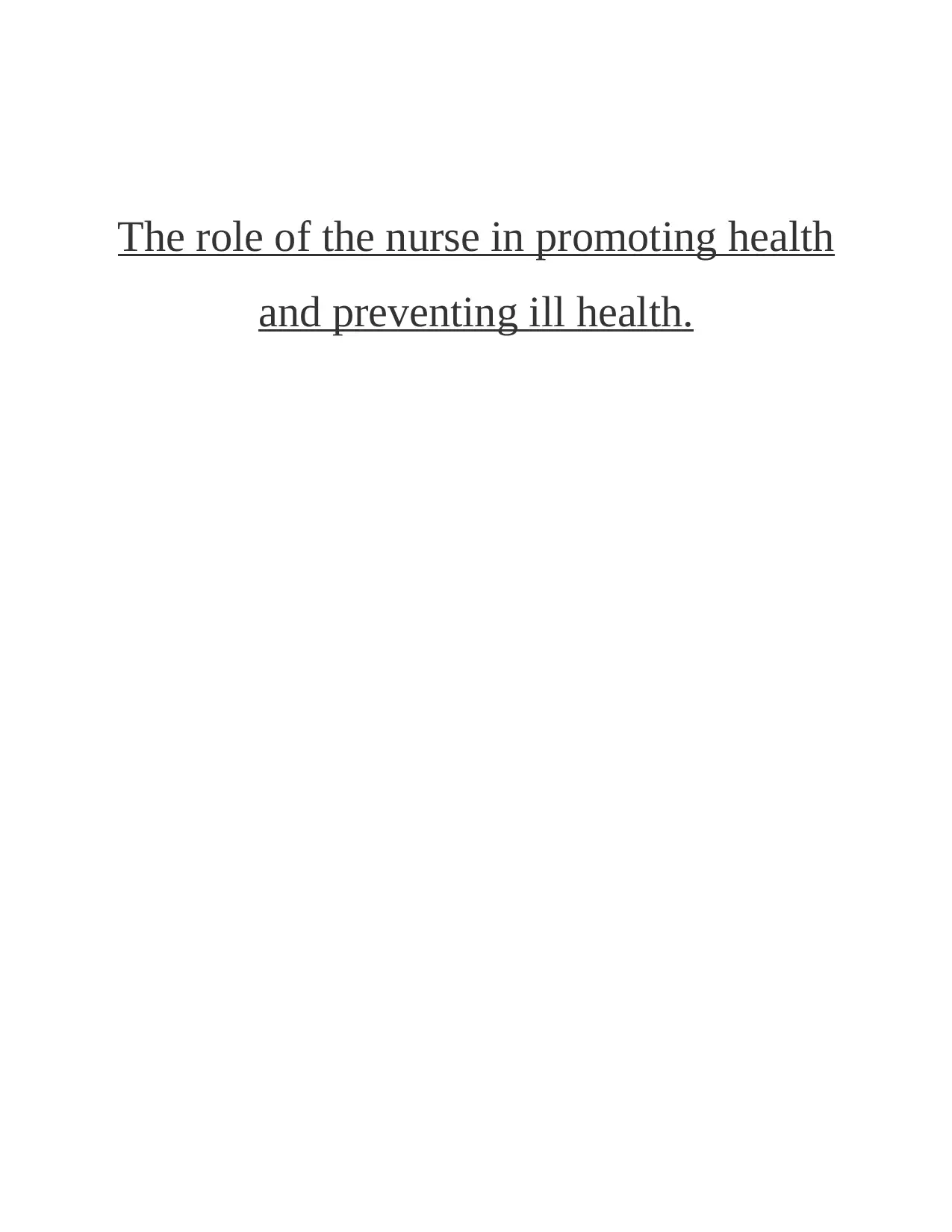
The role of the nurse in promoting health
and preventing ill health.
and preventing ill health.
Paraphrase This Document
Need a fresh take? Get an instant paraphrase of this document with our AI Paraphraser
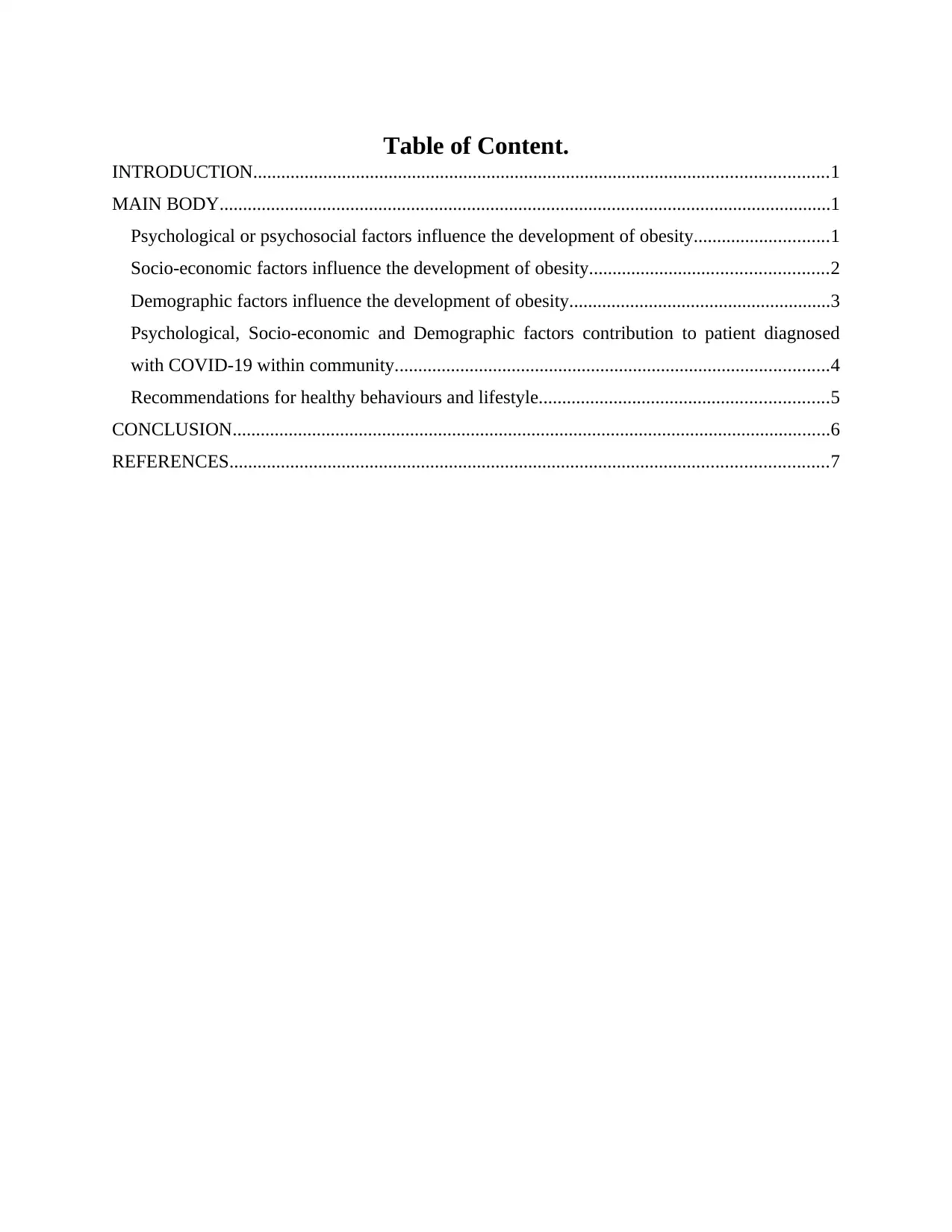
Table of Content.
INTRODUCTION...........................................................................................................................1
MAIN BODY...................................................................................................................................1
Psychological or psychosocial factors influence the development of obesity.............................1
Socio-economic factors influence the development of obesity...................................................2
Demographic factors influence the development of obesity........................................................3
Psychological, Socio-economic and Demographic factors contribution to patient diagnosed
with COVID-19 within community.............................................................................................4
Recommendations for healthy behaviours and lifestyle..............................................................5
CONCLUSION................................................................................................................................6
REFERENCES................................................................................................................................7
INTRODUCTION...........................................................................................................................1
MAIN BODY...................................................................................................................................1
Psychological or psychosocial factors influence the development of obesity.............................1
Socio-economic factors influence the development of obesity...................................................2
Demographic factors influence the development of obesity........................................................3
Psychological, Socio-economic and Demographic factors contribution to patient diagnosed
with COVID-19 within community.............................................................................................4
Recommendations for healthy behaviours and lifestyle..............................................................5
CONCLUSION................................................................................................................................6
REFERENCES................................................................................................................................7

⊘ This is a preview!⊘
Do you want full access?
Subscribe today to unlock all pages.

Trusted by 1+ million students worldwide
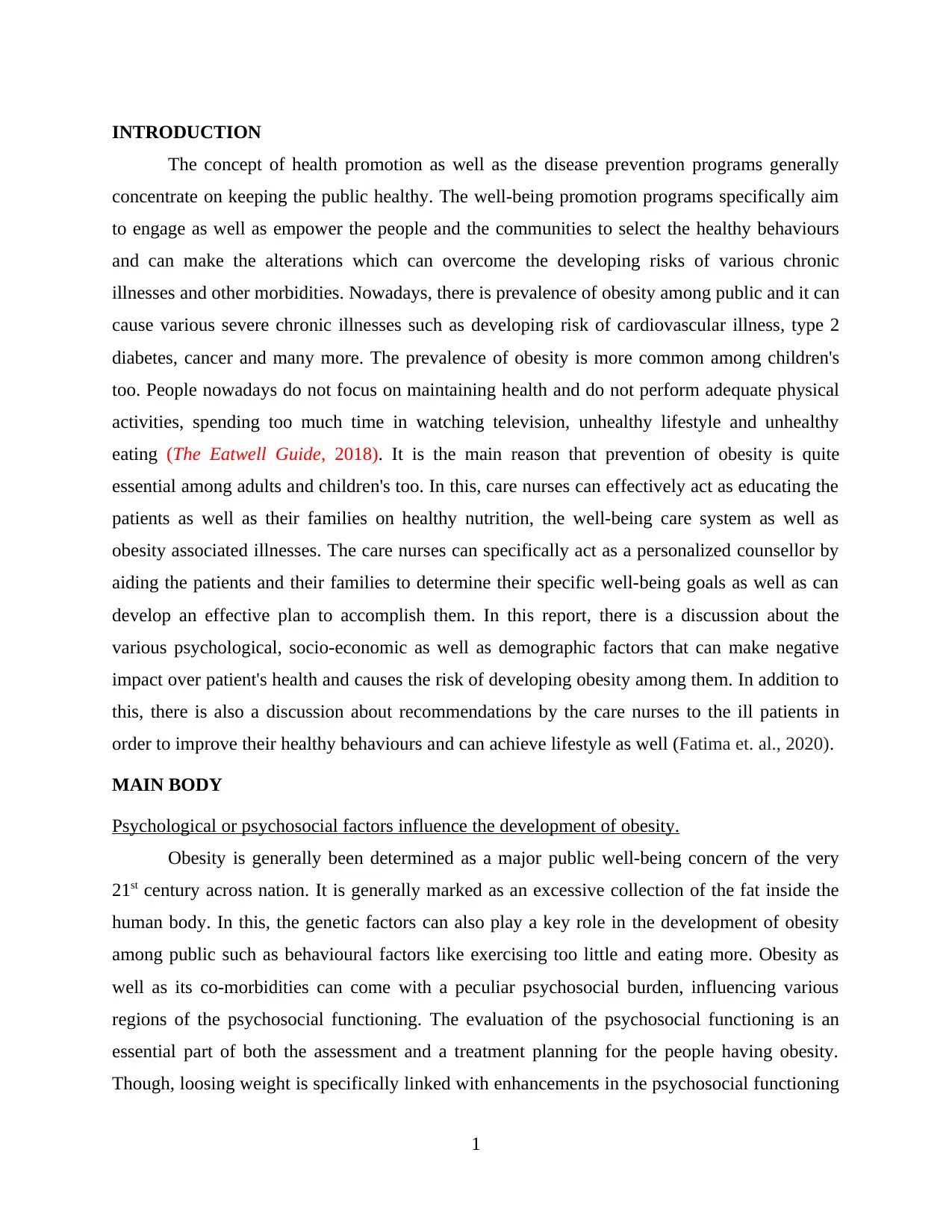
INTRODUCTION
The concept of health promotion as well as the disease prevention programs generally
concentrate on keeping the public healthy. The well-being promotion programs specifically aim
to engage as well as empower the people and the communities to select the healthy behaviours
and can make the alterations which can overcome the developing risks of various chronic
illnesses and other morbidities. Nowadays, there is prevalence of obesity among public and it can
cause various severe chronic illnesses such as developing risk of cardiovascular illness, type 2
diabetes, cancer and many more. The prevalence of obesity is more common among children's
too. People nowadays do not focus on maintaining health and do not perform adequate physical
activities, spending too much time in watching television, unhealthy lifestyle and unhealthy
eating (The Eatwell Guide, 2018). It is the main reason that prevention of obesity is quite
essential among adults and children's too. In this, care nurses can effectively act as educating the
patients as well as their families on healthy nutrition, the well-being care system as well as
obesity associated illnesses. The care nurses can specifically act as a personalized counsellor by
aiding the patients and their families to determine their specific well-being goals as well as can
develop an effective plan to accomplish them. In this report, there is a discussion about the
various psychological, socio-economic as well as demographic factors that can make negative
impact over patient's health and causes the risk of developing obesity among them. In addition to
this, there is also a discussion about recommendations by the care nurses to the ill patients in
order to improve their healthy behaviours and can achieve lifestyle as well (Fatima et. al., 2020).
MAIN BODY
Psychological or psychosocial factors influence the development of obesity.
Obesity is generally been determined as a major public well-being concern of the very
21st century across nation. It is generally marked as an excessive collection of the fat inside the
human body. In this, the genetic factors can also play a key role in the development of obesity
among public such as behavioural factors like exercising too little and eating more. Obesity as
well as its co-morbidities can come with a peculiar psychosocial burden, influencing various
regions of the psychosocial functioning. The evaluation of the psychosocial functioning is an
essential part of both the assessment and a treatment planning for the people having obesity.
Though, loosing weight is specifically linked with enhancements in the psychosocial functioning
1
The concept of health promotion as well as the disease prevention programs generally
concentrate on keeping the public healthy. The well-being promotion programs specifically aim
to engage as well as empower the people and the communities to select the healthy behaviours
and can make the alterations which can overcome the developing risks of various chronic
illnesses and other morbidities. Nowadays, there is prevalence of obesity among public and it can
cause various severe chronic illnesses such as developing risk of cardiovascular illness, type 2
diabetes, cancer and many more. The prevalence of obesity is more common among children's
too. People nowadays do not focus on maintaining health and do not perform adequate physical
activities, spending too much time in watching television, unhealthy lifestyle and unhealthy
eating (The Eatwell Guide, 2018). It is the main reason that prevention of obesity is quite
essential among adults and children's too. In this, care nurses can effectively act as educating the
patients as well as their families on healthy nutrition, the well-being care system as well as
obesity associated illnesses. The care nurses can specifically act as a personalized counsellor by
aiding the patients and their families to determine their specific well-being goals as well as can
develop an effective plan to accomplish them. In this report, there is a discussion about the
various psychological, socio-economic as well as demographic factors that can make negative
impact over patient's health and causes the risk of developing obesity among them. In addition to
this, there is also a discussion about recommendations by the care nurses to the ill patients in
order to improve their healthy behaviours and can achieve lifestyle as well (Fatima et. al., 2020).
MAIN BODY
Psychological or psychosocial factors influence the development of obesity.
Obesity is generally been determined as a major public well-being concern of the very
21st century across nation. It is generally marked as an excessive collection of the fat inside the
human body. In this, the genetic factors can also play a key role in the development of obesity
among public such as behavioural factors like exercising too little and eating more. Obesity as
well as its co-morbidities can come with a peculiar psychosocial burden, influencing various
regions of the psychosocial functioning. The evaluation of the psychosocial functioning is an
essential part of both the assessment and a treatment planning for the people having obesity.
Though, loosing weight is specifically linked with enhancements in the psychosocial functioning
1
Paraphrase This Document
Need a fresh take? Get an instant paraphrase of this document with our AI Paraphraser
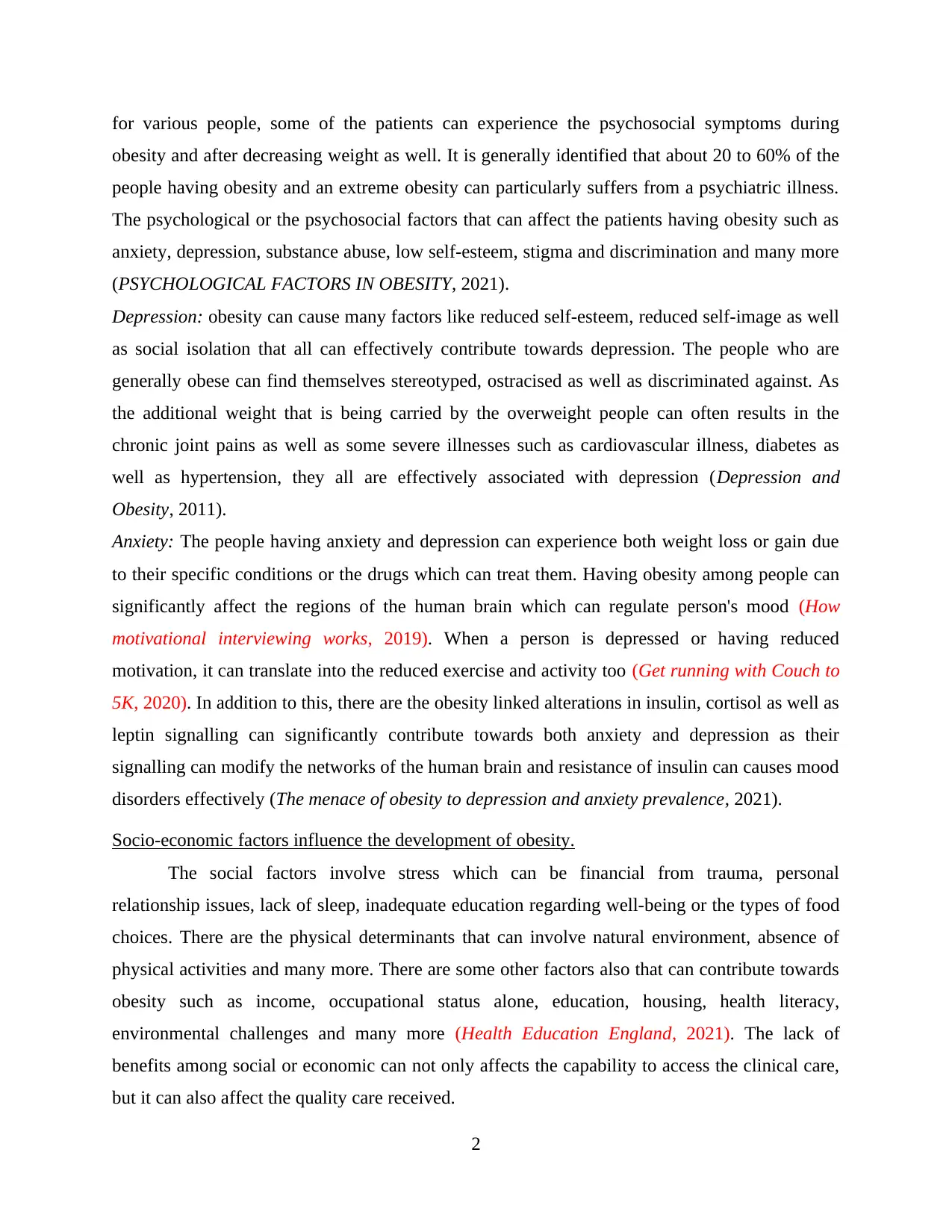
for various people, some of the patients can experience the psychosocial symptoms during
obesity and after decreasing weight as well. It is generally identified that about 20 to 60% of the
people having obesity and an extreme obesity can particularly suffers from a psychiatric illness.
The psychological or the psychosocial factors that can affect the patients having obesity such as
anxiety, depression, substance abuse, low self-esteem, stigma and discrimination and many more
(PSYCHOLOGICAL FACTORS IN OBESITY, 2021).
Depression: obesity can cause many factors like reduced self-esteem, reduced self-image as well
as social isolation that all can effectively contribute towards depression. The people who are
generally obese can find themselves stereotyped, ostracised as well as discriminated against. As
the additional weight that is being carried by the overweight people can often results in the
chronic joint pains as well as some severe illnesses such as cardiovascular illness, diabetes as
well as hypertension, they all are effectively associated with depression (Depression and
Obesity, 2011).
Anxiety: The people having anxiety and depression can experience both weight loss or gain due
to their specific conditions or the drugs which can treat them. Having obesity among people can
significantly affect the regions of the human brain which can regulate person's mood (How
motivational interviewing works, 2019). When a person is depressed or having reduced
motivation, it can translate into the reduced exercise and activity too (Get running with Couch to
5K, 2020). In addition to this, there are the obesity linked alterations in insulin, cortisol as well as
leptin signalling can significantly contribute towards both anxiety and depression as their
signalling can modify the networks of the human brain and resistance of insulin can causes mood
disorders effectively (The menace of obesity to depression and anxiety prevalence, 2021).
Socio-economic factors influence the development of obesity.
The social factors involve stress which can be financial from trauma, personal
relationship issues, lack of sleep, inadequate education regarding well-being or the types of food
choices. There are the physical determinants that can involve natural environment, absence of
physical activities and many more. There are some other factors also that can contribute towards
obesity such as income, occupational status alone, education, housing, health literacy,
environmental challenges and many more (Health Education England, 2021). The lack of
benefits among social or economic can not only affects the capability to access the clinical care,
but it can also affect the quality care received.
2
obesity and after decreasing weight as well. It is generally identified that about 20 to 60% of the
people having obesity and an extreme obesity can particularly suffers from a psychiatric illness.
The psychological or the psychosocial factors that can affect the patients having obesity such as
anxiety, depression, substance abuse, low self-esteem, stigma and discrimination and many more
(PSYCHOLOGICAL FACTORS IN OBESITY, 2021).
Depression: obesity can cause many factors like reduced self-esteem, reduced self-image as well
as social isolation that all can effectively contribute towards depression. The people who are
generally obese can find themselves stereotyped, ostracised as well as discriminated against. As
the additional weight that is being carried by the overweight people can often results in the
chronic joint pains as well as some severe illnesses such as cardiovascular illness, diabetes as
well as hypertension, they all are effectively associated with depression (Depression and
Obesity, 2011).
Anxiety: The people having anxiety and depression can experience both weight loss or gain due
to their specific conditions or the drugs which can treat them. Having obesity among people can
significantly affect the regions of the human brain which can regulate person's mood (How
motivational interviewing works, 2019). When a person is depressed or having reduced
motivation, it can translate into the reduced exercise and activity too (Get running with Couch to
5K, 2020). In addition to this, there are the obesity linked alterations in insulin, cortisol as well as
leptin signalling can significantly contribute towards both anxiety and depression as their
signalling can modify the networks of the human brain and resistance of insulin can causes mood
disorders effectively (The menace of obesity to depression and anxiety prevalence, 2021).
Socio-economic factors influence the development of obesity.
The social factors involve stress which can be financial from trauma, personal
relationship issues, lack of sleep, inadequate education regarding well-being or the types of food
choices. There are the physical determinants that can involve natural environment, absence of
physical activities and many more. There are some other factors also that can contribute towards
obesity such as income, occupational status alone, education, housing, health literacy,
environmental challenges and many more (Health Education England, 2021). The lack of
benefits among social or economic can not only affects the capability to access the clinical care,
but it can also affect the quality care received.
2
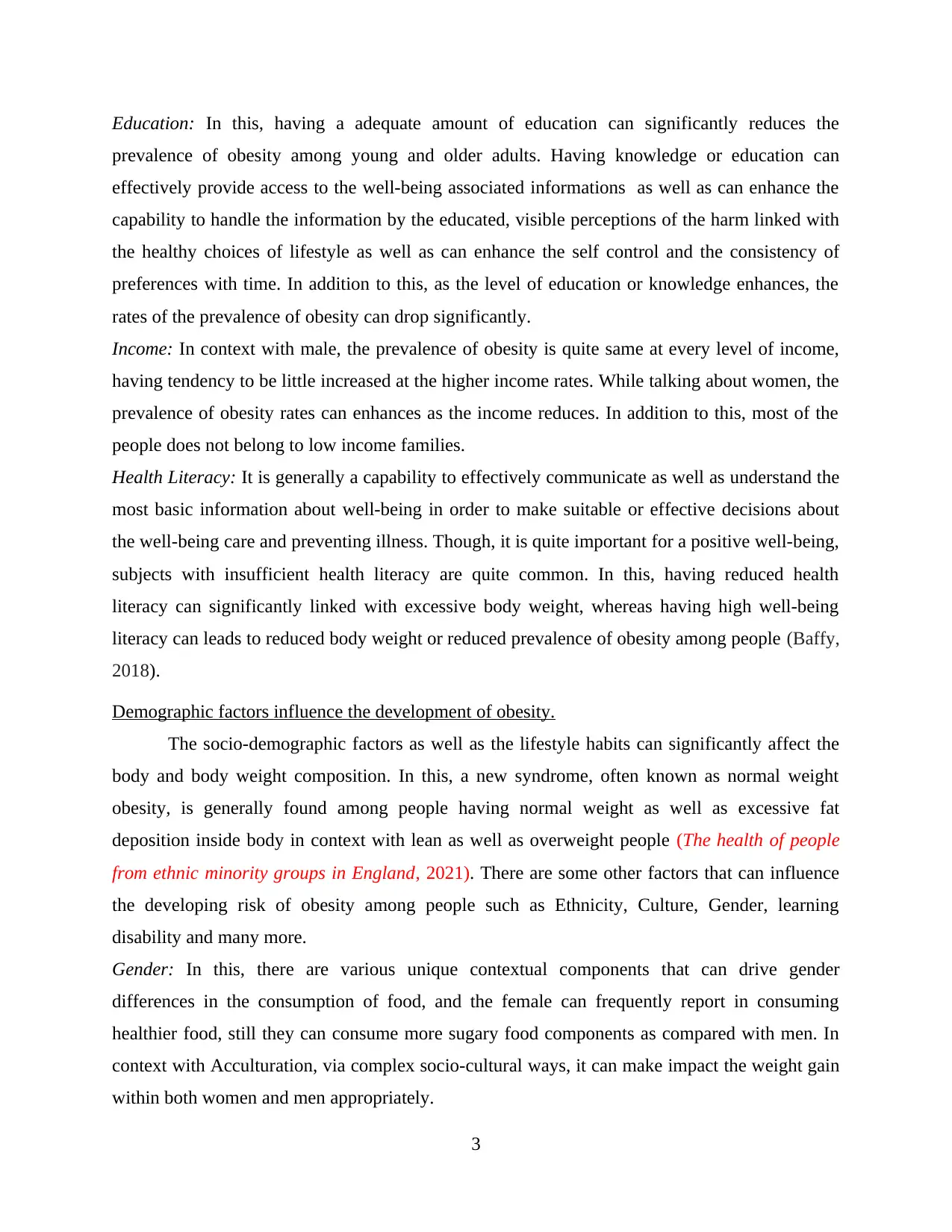
Education: In this, having a adequate amount of education can significantly reduces the
prevalence of obesity among young and older adults. Having knowledge or education can
effectively provide access to the well-being associated informations as well as can enhance the
capability to handle the information by the educated, visible perceptions of the harm linked with
the healthy choices of lifestyle as well as can enhance the self control and the consistency of
preferences with time. In addition to this, as the level of education or knowledge enhances, the
rates of the prevalence of obesity can drop significantly.
Income: In context with male, the prevalence of obesity is quite same at every level of income,
having tendency to be little increased at the higher income rates. While talking about women, the
prevalence of obesity rates can enhances as the income reduces. In addition to this, most of the
people does not belong to low income families.
Health Literacy: It is generally a capability to effectively communicate as well as understand the
most basic information about well-being in order to make suitable or effective decisions about
the well-being care and preventing illness. Though, it is quite important for a positive well-being,
subjects with insufficient health literacy are quite common. In this, having reduced health
literacy can significantly linked with excessive body weight, whereas having high well-being
literacy can leads to reduced body weight or reduced prevalence of obesity among people (Baffy,
2018).
Demographic factors influence the development of obesity.
The socio-demographic factors as well as the lifestyle habits can significantly affect the
body and body weight composition. In this, a new syndrome, often known as normal weight
obesity, is generally found among people having normal weight as well as excessive fat
deposition inside body in context with lean as well as overweight people (The health of people
from ethnic minority groups in England, 2021). There are some other factors that can influence
the developing risk of obesity among people such as Ethnicity, Culture, Gender, learning
disability and many more.
Gender: In this, there are various unique contextual components that can drive gender
differences in the consumption of food, and the female can frequently report in consuming
healthier food, still they can consume more sugary food components as compared with men. In
context with Acculturation, via complex socio-cultural ways, it can make impact the weight gain
within both women and men appropriately.
3
prevalence of obesity among young and older adults. Having knowledge or education can
effectively provide access to the well-being associated informations as well as can enhance the
capability to handle the information by the educated, visible perceptions of the harm linked with
the healthy choices of lifestyle as well as can enhance the self control and the consistency of
preferences with time. In addition to this, as the level of education or knowledge enhances, the
rates of the prevalence of obesity can drop significantly.
Income: In context with male, the prevalence of obesity is quite same at every level of income,
having tendency to be little increased at the higher income rates. While talking about women, the
prevalence of obesity rates can enhances as the income reduces. In addition to this, most of the
people does not belong to low income families.
Health Literacy: It is generally a capability to effectively communicate as well as understand the
most basic information about well-being in order to make suitable or effective decisions about
the well-being care and preventing illness. Though, it is quite important for a positive well-being,
subjects with insufficient health literacy are quite common. In this, having reduced health
literacy can significantly linked with excessive body weight, whereas having high well-being
literacy can leads to reduced body weight or reduced prevalence of obesity among people (Baffy,
2018).
Demographic factors influence the development of obesity.
The socio-demographic factors as well as the lifestyle habits can significantly affect the
body and body weight composition. In this, a new syndrome, often known as normal weight
obesity, is generally found among people having normal weight as well as excessive fat
deposition inside body in context with lean as well as overweight people (The health of people
from ethnic minority groups in England, 2021). There are some other factors that can influence
the developing risk of obesity among people such as Ethnicity, Culture, Gender, learning
disability and many more.
Gender: In this, there are various unique contextual components that can drive gender
differences in the consumption of food, and the female can frequently report in consuming
healthier food, still they can consume more sugary food components as compared with men. In
context with Acculturation, via complex socio-cultural ways, it can make impact the weight gain
within both women and men appropriately.
3
⊘ This is a preview!⊘
Do you want full access?
Subscribe today to unlock all pages.

Trusted by 1+ million students worldwide
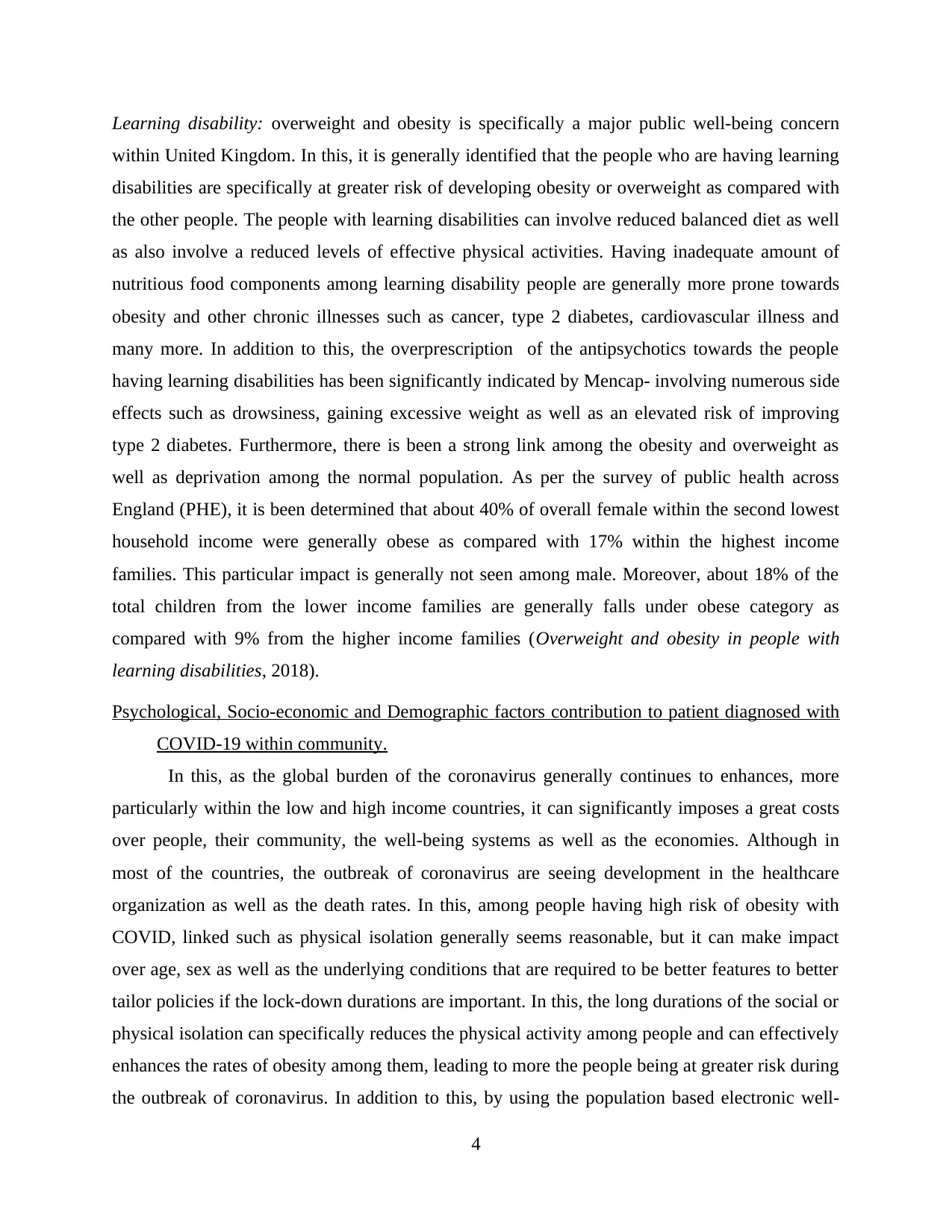
Learning disability: overweight and obesity is specifically a major public well-being concern
within United Kingdom. In this, it is generally identified that the people who are having learning
disabilities are specifically at greater risk of developing obesity or overweight as compared with
the other people. The people with learning disabilities can involve reduced balanced diet as well
as also involve a reduced levels of effective physical activities. Having inadequate amount of
nutritious food components among learning disability people are generally more prone towards
obesity and other chronic illnesses such as cancer, type 2 diabetes, cardiovascular illness and
many more. In addition to this, the overprescription of the antipsychotics towards the people
having learning disabilities has been significantly indicated by Mencap- involving numerous side
effects such as drowsiness, gaining excessive weight as well as an elevated risk of improving
type 2 diabetes. Furthermore, there is been a strong link among the obesity and overweight as
well as deprivation among the normal population. As per the survey of public health across
England (PHE), it is been determined that about 40% of overall female within the second lowest
household income were generally obese as compared with 17% within the highest income
families. This particular impact is generally not seen among male. Moreover, about 18% of the
total children from the lower income families are generally falls under obese category as
compared with 9% from the higher income families (Overweight and obesity in people with
learning disabilities, 2018).
Psychological, Socio-economic and Demographic factors contribution to patient diagnosed with
COVID-19 within community.
In this, as the global burden of the coronavirus generally continues to enhances, more
particularly within the low and high income countries, it can significantly imposes a great costs
over people, their community, the well-being systems as well as the economies. Although in
most of the countries, the outbreak of coronavirus are seeing development in the healthcare
organization as well as the death rates. In this, among people having high risk of obesity with
COVID, linked such as physical isolation generally seems reasonable, but it can make impact
over age, sex as well as the underlying conditions that are required to be better features to better
tailor policies if the lock-down durations are important. In this, the long durations of the social or
physical isolation can specifically reduces the physical activity among people and can effectively
enhances the rates of obesity among them, leading to more the people being at greater risk during
the outbreak of coronavirus. In addition to this, by using the population based electronic well-
4
within United Kingdom. In this, it is generally identified that the people who are having learning
disabilities are specifically at greater risk of developing obesity or overweight as compared with
the other people. The people with learning disabilities can involve reduced balanced diet as well
as also involve a reduced levels of effective physical activities. Having inadequate amount of
nutritious food components among learning disability people are generally more prone towards
obesity and other chronic illnesses such as cancer, type 2 diabetes, cardiovascular illness and
many more. In addition to this, the overprescription of the antipsychotics towards the people
having learning disabilities has been significantly indicated by Mencap- involving numerous side
effects such as drowsiness, gaining excessive weight as well as an elevated risk of improving
type 2 diabetes. Furthermore, there is been a strong link among the obesity and overweight as
well as deprivation among the normal population. As per the survey of public health across
England (PHE), it is been determined that about 40% of overall female within the second lowest
household income were generally obese as compared with 17% within the highest income
families. This particular impact is generally not seen among male. Moreover, about 18% of the
total children from the lower income families are generally falls under obese category as
compared with 9% from the higher income families (Overweight and obesity in people with
learning disabilities, 2018).
Psychological, Socio-economic and Demographic factors contribution to patient diagnosed with
COVID-19 within community.
In this, as the global burden of the coronavirus generally continues to enhances, more
particularly within the low and high income countries, it can significantly imposes a great costs
over people, their community, the well-being systems as well as the economies. Although in
most of the countries, the outbreak of coronavirus are seeing development in the healthcare
organization as well as the death rates. In this, among people having high risk of obesity with
COVID, linked such as physical isolation generally seems reasonable, but it can make impact
over age, sex as well as the underlying conditions that are required to be better features to better
tailor policies if the lock-down durations are important. In this, the long durations of the social or
physical isolation can specifically reduces the physical activity among people and can effectively
enhances the rates of obesity among them, leading to more the people being at greater risk during
the outbreak of coronavirus. In addition to this, by using the population based electronic well-
4
Paraphrase This Document
Need a fresh take? Get an instant paraphrase of this document with our AI Paraphraser
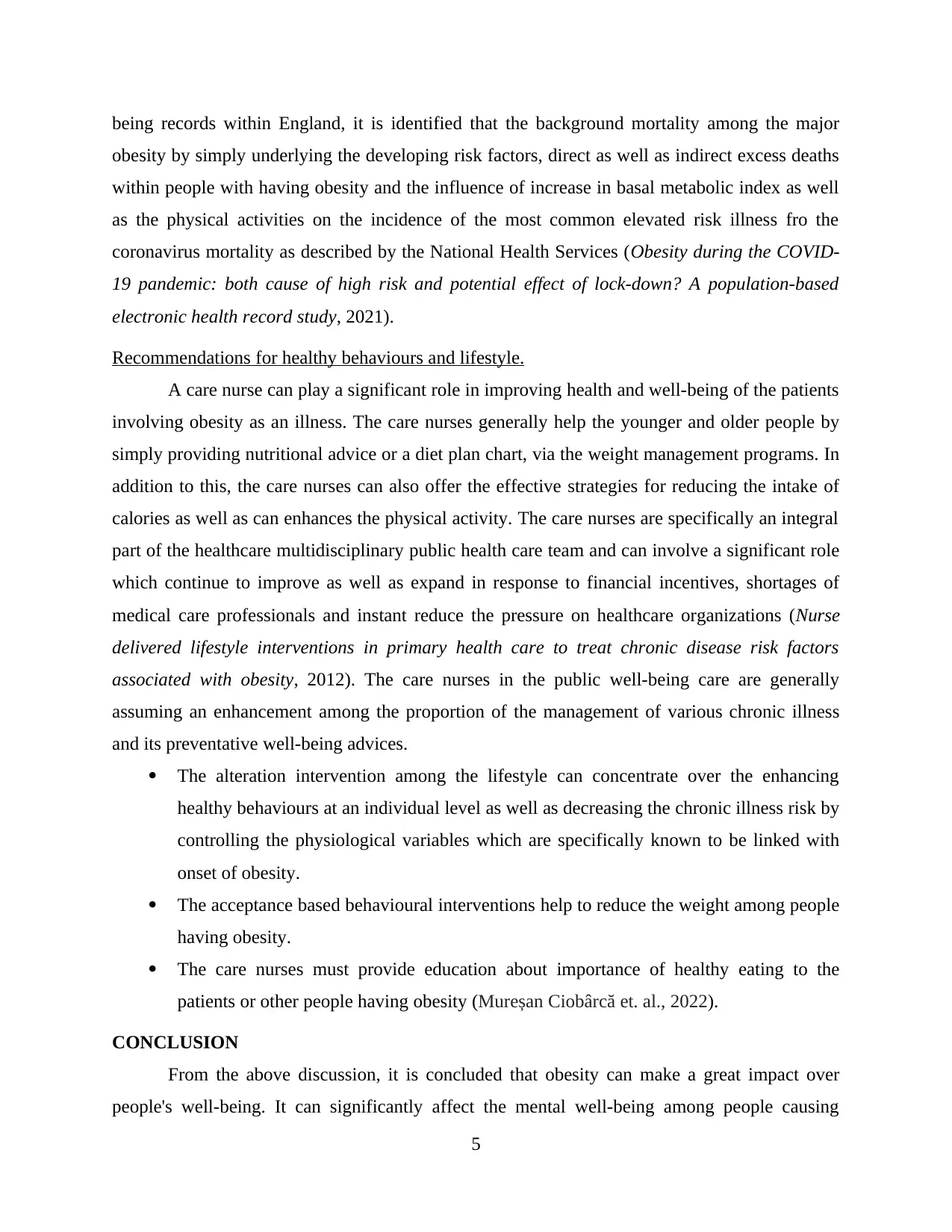
being records within England, it is identified that the background mortality among the major
obesity by simply underlying the developing risk factors, direct as well as indirect excess deaths
within people with having obesity and the influence of increase in basal metabolic index as well
as the physical activities on the incidence of the most common elevated risk illness fro the
coronavirus mortality as described by the National Health Services (Obesity during the COVID-
19 pandemic: both cause of high risk and potential effect of lock-down? A population-based
electronic health record study, 2021).
Recommendations for healthy behaviours and lifestyle.
A care nurse can play a significant role in improving health and well-being of the patients
involving obesity as an illness. The care nurses generally help the younger and older people by
simply providing nutritional advice or a diet plan chart, via the weight management programs. In
addition to this, the care nurses can also offer the effective strategies for reducing the intake of
calories as well as can enhances the physical activity. The care nurses are specifically an integral
part of the healthcare multidisciplinary public health care team and can involve a significant role
which continue to improve as well as expand in response to financial incentives, shortages of
medical care professionals and instant reduce the pressure on healthcare organizations (Nurse
delivered lifestyle interventions in primary health care to treat chronic disease risk factors
associated with obesity, 2012). The care nurses in the public well-being care are generally
assuming an enhancement among the proportion of the management of various chronic illness
and its preventative well-being advices.
The alteration intervention among the lifestyle can concentrate over the enhancing
healthy behaviours at an individual level as well as decreasing the chronic illness risk by
controlling the physiological variables which are specifically known to be linked with
onset of obesity.
The acceptance based behavioural interventions help to reduce the weight among people
having obesity.
The care nurses must provide education about importance of healthy eating to the
patients or other people having obesity (Mureșan Ciobârcă et. al., 2022).
CONCLUSION
From the above discussion, it is concluded that obesity can make a great impact over
people's well-being. It can significantly affect the mental well-being among people causing
5
obesity by simply underlying the developing risk factors, direct as well as indirect excess deaths
within people with having obesity and the influence of increase in basal metabolic index as well
as the physical activities on the incidence of the most common elevated risk illness fro the
coronavirus mortality as described by the National Health Services (Obesity during the COVID-
19 pandemic: both cause of high risk and potential effect of lock-down? A population-based
electronic health record study, 2021).
Recommendations for healthy behaviours and lifestyle.
A care nurse can play a significant role in improving health and well-being of the patients
involving obesity as an illness. The care nurses generally help the younger and older people by
simply providing nutritional advice or a diet plan chart, via the weight management programs. In
addition to this, the care nurses can also offer the effective strategies for reducing the intake of
calories as well as can enhances the physical activity. The care nurses are specifically an integral
part of the healthcare multidisciplinary public health care team and can involve a significant role
which continue to improve as well as expand in response to financial incentives, shortages of
medical care professionals and instant reduce the pressure on healthcare organizations (Nurse
delivered lifestyle interventions in primary health care to treat chronic disease risk factors
associated with obesity, 2012). The care nurses in the public well-being care are generally
assuming an enhancement among the proportion of the management of various chronic illness
and its preventative well-being advices.
The alteration intervention among the lifestyle can concentrate over the enhancing
healthy behaviours at an individual level as well as decreasing the chronic illness risk by
controlling the physiological variables which are specifically known to be linked with
onset of obesity.
The acceptance based behavioural interventions help to reduce the weight among people
having obesity.
The care nurses must provide education about importance of healthy eating to the
patients or other people having obesity (Mureșan Ciobârcă et. al., 2022).
CONCLUSION
From the above discussion, it is concluded that obesity can make a great impact over
people's well-being. It can significantly affect the mental well-being among people causing
5
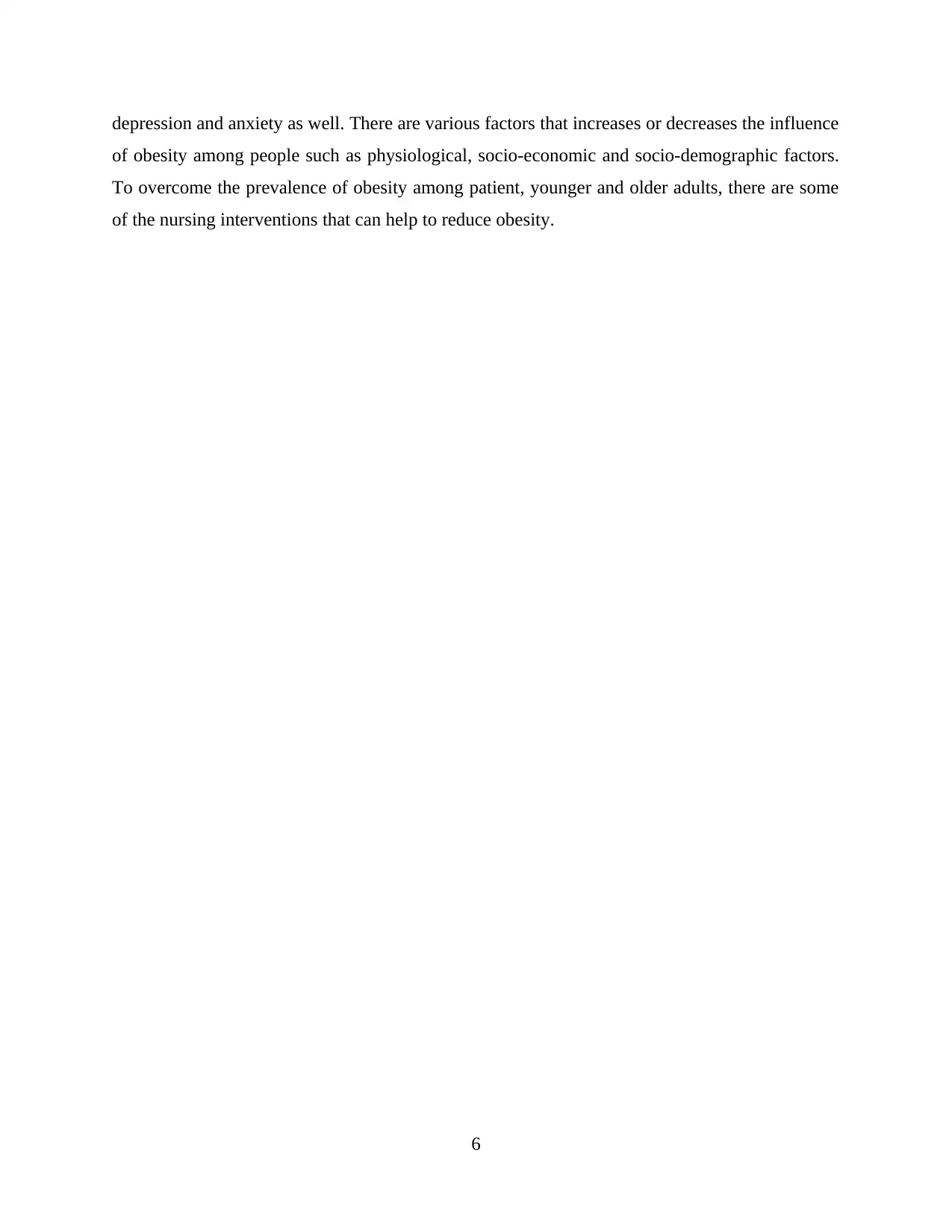
depression and anxiety as well. There are various factors that increases or decreases the influence
of obesity among people such as physiological, socio-economic and socio-demographic factors.
To overcome the prevalence of obesity among patient, younger and older adults, there are some
of the nursing interventions that can help to reduce obesity.
6
of obesity among people such as physiological, socio-economic and socio-demographic factors.
To overcome the prevalence of obesity among patient, younger and older adults, there are some
of the nursing interventions that can help to reduce obesity.
6
⊘ This is a preview!⊘
Do you want full access?
Subscribe today to unlock all pages.

Trusted by 1+ million students worldwide
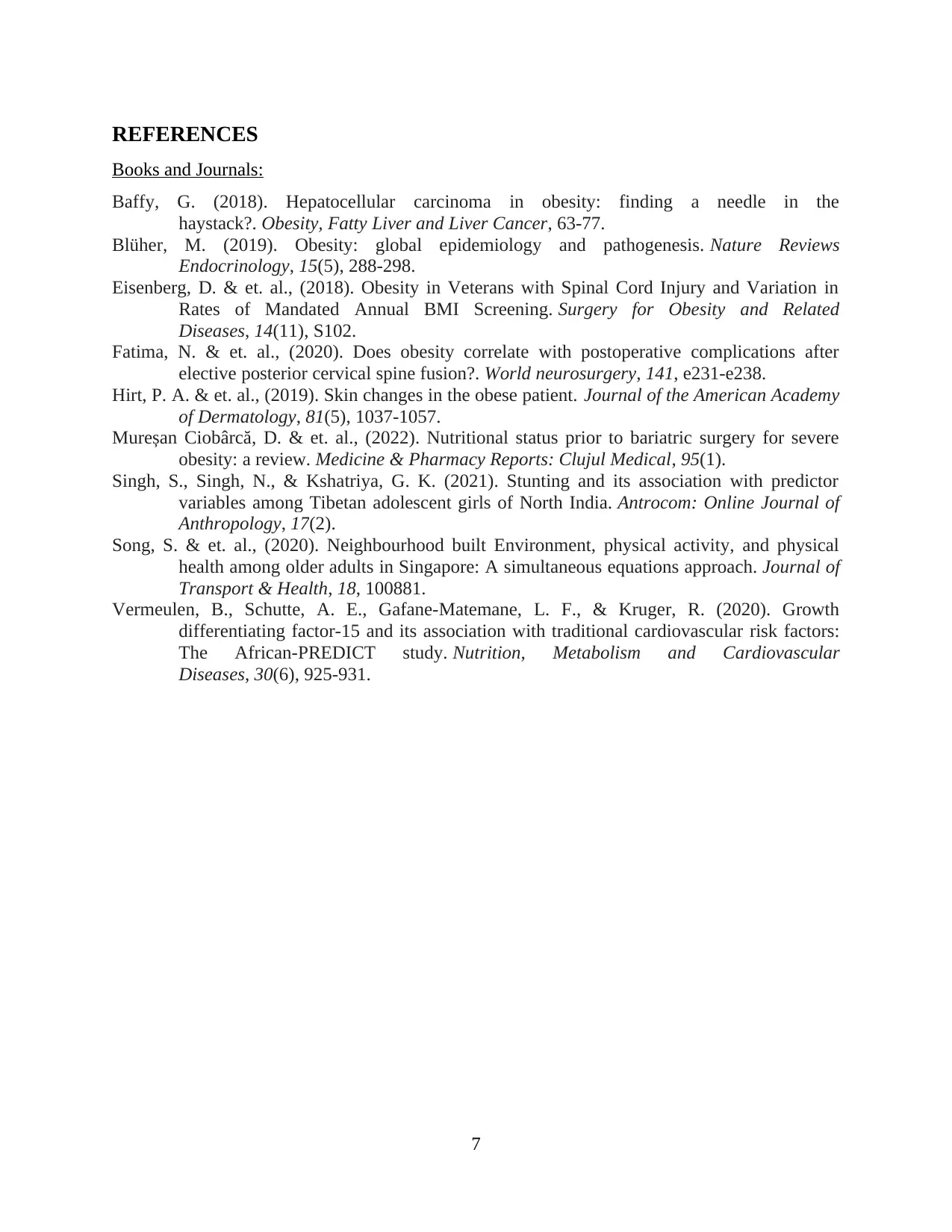
REFERENCES
Books and Journals:
Baffy, G. (2018). Hepatocellular carcinoma in obesity: finding a needle in the
haystack?. Obesity, Fatty Liver and Liver Cancer, 63-77.
Blüher, M. (2019). Obesity: global epidemiology and pathogenesis. Nature Reviews
Endocrinology, 15(5), 288-298.
Eisenberg, D. & et. al., (2018). Obesity in Veterans with Spinal Cord Injury and Variation in
Rates of Mandated Annual BMI Screening. Surgery for Obesity and Related
Diseases, 14(11), S102.
Fatima, N. & et. al., (2020). Does obesity correlate with postoperative complications after
elective posterior cervical spine fusion?. World neurosurgery, 141, e231-e238.
Hirt, P. A. & et. al., (2019). Skin changes in the obese patient. Journal of the American Academy
of Dermatology, 81(5), 1037-1057.
Mureșan Ciobârcă, D. & et. al., (2022). Nutritional status prior to bariatric surgery for severe
obesity: a review. Medicine & Pharmacy Reports: Clujul Medical, 95(1).
Singh, S., Singh, N., & Kshatriya, G. K. (2021). Stunting and its association with predictor
variables among Tibetan adolescent girls of North India. Antrocom: Online Journal of
Anthropology, 17(2).
Song, S. & et. al., (2020). Neighbourhood built Environment, physical activity, and physical
health among older adults in Singapore: A simultaneous equations approach. Journal of
Transport & Health, 18, 100881.
Vermeulen, B., Schutte, A. E., Gafane-Matemane, L. F., & Kruger, R. (2020). Growth
differentiating factor-15 and its association with traditional cardiovascular risk factors:
The African-PREDICT study. Nutrition, Metabolism and Cardiovascular
Diseases, 30(6), 925-931.
7
Books and Journals:
Baffy, G. (2018). Hepatocellular carcinoma in obesity: finding a needle in the
haystack?. Obesity, Fatty Liver and Liver Cancer, 63-77.
Blüher, M. (2019). Obesity: global epidemiology and pathogenesis. Nature Reviews
Endocrinology, 15(5), 288-298.
Eisenberg, D. & et. al., (2018). Obesity in Veterans with Spinal Cord Injury and Variation in
Rates of Mandated Annual BMI Screening. Surgery for Obesity and Related
Diseases, 14(11), S102.
Fatima, N. & et. al., (2020). Does obesity correlate with postoperative complications after
elective posterior cervical spine fusion?. World neurosurgery, 141, e231-e238.
Hirt, P. A. & et. al., (2019). Skin changes in the obese patient. Journal of the American Academy
of Dermatology, 81(5), 1037-1057.
Mureșan Ciobârcă, D. & et. al., (2022). Nutritional status prior to bariatric surgery for severe
obesity: a review. Medicine & Pharmacy Reports: Clujul Medical, 95(1).
Singh, S., Singh, N., & Kshatriya, G. K. (2021). Stunting and its association with predictor
variables among Tibetan adolescent girls of North India. Antrocom: Online Journal of
Anthropology, 17(2).
Song, S. & et. al., (2020). Neighbourhood built Environment, physical activity, and physical
health among older adults in Singapore: A simultaneous equations approach. Journal of
Transport & Health, 18, 100881.
Vermeulen, B., Schutte, A. E., Gafane-Matemane, L. F., & Kruger, R. (2020). Growth
differentiating factor-15 and its association with traditional cardiovascular risk factors:
The African-PREDICT study. Nutrition, Metabolism and Cardiovascular
Diseases, 30(6), 925-931.
7
Paraphrase This Document
Need a fresh take? Get an instant paraphrase of this document with our AI Paraphraser
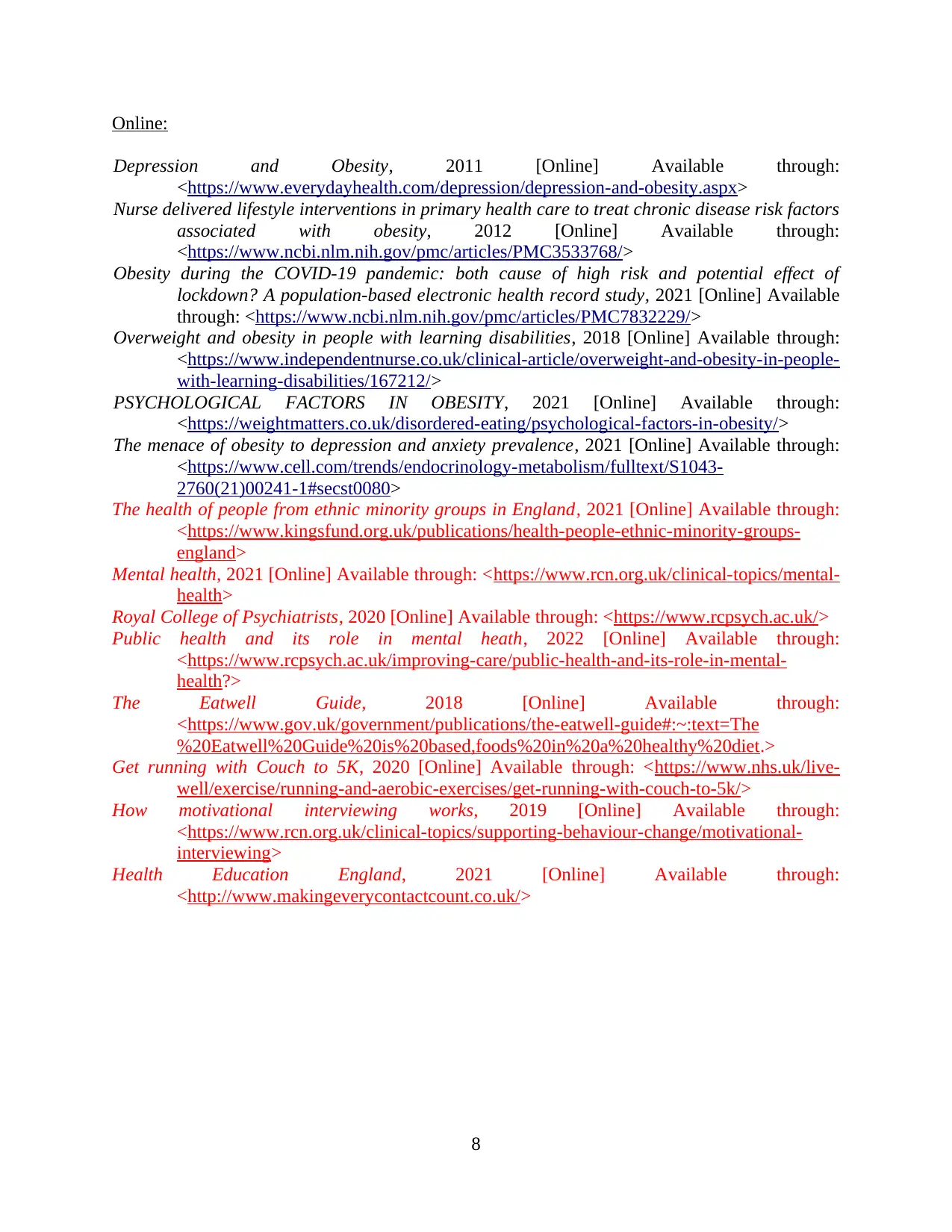
Online:
Depression and Obesity, 2011 [Online] Available through:
<https://www.everydayhealth.com/depression/depression-and-obesity.aspx>
Nurse delivered lifestyle interventions in primary health care to treat chronic disease risk factors
associated with obesity, 2012 [Online] Available through:
<https://www.ncbi.nlm.nih.gov/pmc/articles/PMC3533768/>
Obesity during the COVID-19 pandemic: both cause of high risk and potential effect of
lockdown? A population-based electronic health record study, 2021 [Online] Available
through: <https://www.ncbi.nlm.nih.gov/pmc/articles/PMC7832229/>
Overweight and obesity in people with learning disabilities, 2018 [Online] Available through:
<https://www.independentnurse.co.uk/clinical-article/overweight-and-obesity-in-people-
with-learning-disabilities/167212/>
PSYCHOLOGICAL FACTORS IN OBESITY, 2021 [Online] Available through:
<https://weightmatters.co.uk/disordered-eating/psychological-factors-in-obesity/>
The menace of obesity to depression and anxiety prevalence, 2021 [Online] Available through:
<https://www.cell.com/trends/endocrinology-metabolism/fulltext/S1043-
2760(21)00241-1#secst0080>
The health of people from ethnic minority groups in England, 2021 [Online] Available through:
<https://www.kingsfund.org.uk/publications/health-people-ethnic-minority-groups-
england>
Mental health, 2021 [Online] Available through: <https://www.rcn.org.uk/clinical-topics/mental-
health>
Royal College of Psychiatrists, 2020 [Online] Available through: <https://www.rcpsych.ac.uk/>
Public health and its role in mental heath, 2022 [Online] Available through:
<https://www.rcpsych.ac.uk/improving-care/public-health-and-its-role-in-mental-
health?>
The Eatwell Guide, 2018 [Online] Available through:
<https://www.gov.uk/government/publications/the-eatwell-guide#:~:text=The
%20Eatwell%20Guide%20is%20based,foods%20in%20a%20healthy%20diet.>
Get running with Couch to 5K, 2020 [Online] Available through: <https://www.nhs.uk/live-
well/exercise/running-and-aerobic-exercises/get-running-with-couch-to-5k/>
How motivational interviewing works, 2019 [Online] Available through:
<https://www.rcn.org.uk/clinical-topics/supporting-behaviour-change/motivational-
interviewing>
Health Education England, 2021 [Online] Available through:
<http://www.makingeverycontactcount.co.uk/>
8
Depression and Obesity, 2011 [Online] Available through:
<https://www.everydayhealth.com/depression/depression-and-obesity.aspx>
Nurse delivered lifestyle interventions in primary health care to treat chronic disease risk factors
associated with obesity, 2012 [Online] Available through:
<https://www.ncbi.nlm.nih.gov/pmc/articles/PMC3533768/>
Obesity during the COVID-19 pandemic: both cause of high risk and potential effect of
lockdown? A population-based electronic health record study, 2021 [Online] Available
through: <https://www.ncbi.nlm.nih.gov/pmc/articles/PMC7832229/>
Overweight and obesity in people with learning disabilities, 2018 [Online] Available through:
<https://www.independentnurse.co.uk/clinical-article/overweight-and-obesity-in-people-
with-learning-disabilities/167212/>
PSYCHOLOGICAL FACTORS IN OBESITY, 2021 [Online] Available through:
<https://weightmatters.co.uk/disordered-eating/psychological-factors-in-obesity/>
The menace of obesity to depression and anxiety prevalence, 2021 [Online] Available through:
<https://www.cell.com/trends/endocrinology-metabolism/fulltext/S1043-
2760(21)00241-1#secst0080>
The health of people from ethnic minority groups in England, 2021 [Online] Available through:
<https://www.kingsfund.org.uk/publications/health-people-ethnic-minority-groups-
england>
Mental health, 2021 [Online] Available through: <https://www.rcn.org.uk/clinical-topics/mental-
health>
Royal College of Psychiatrists, 2020 [Online] Available through: <https://www.rcpsych.ac.uk/>
Public health and its role in mental heath, 2022 [Online] Available through:
<https://www.rcpsych.ac.uk/improving-care/public-health-and-its-role-in-mental-
health?>
The Eatwell Guide, 2018 [Online] Available through:
<https://www.gov.uk/government/publications/the-eatwell-guide#:~:text=The
%20Eatwell%20Guide%20is%20based,foods%20in%20a%20healthy%20diet.>
Get running with Couch to 5K, 2020 [Online] Available through: <https://www.nhs.uk/live-
well/exercise/running-and-aerobic-exercises/get-running-with-couch-to-5k/>
How motivational interviewing works, 2019 [Online] Available through:
<https://www.rcn.org.uk/clinical-topics/supporting-behaviour-change/motivational-
interviewing>
Health Education England, 2021 [Online] Available through:
<http://www.makingeverycontactcount.co.uk/>
8

9
⊘ This is a preview!⊘
Do you want full access?
Subscribe today to unlock all pages.

Trusted by 1+ million students worldwide
1 out of 12
Related Documents
Your All-in-One AI-Powered Toolkit for Academic Success.
+13062052269
info@desklib.com
Available 24*7 on WhatsApp / Email
![[object Object]](/_next/static/media/star-bottom.7253800d.svg)
Unlock your academic potential
Copyright © 2020–2026 A2Z Services. All Rights Reserved. Developed and managed by ZUCOL.





